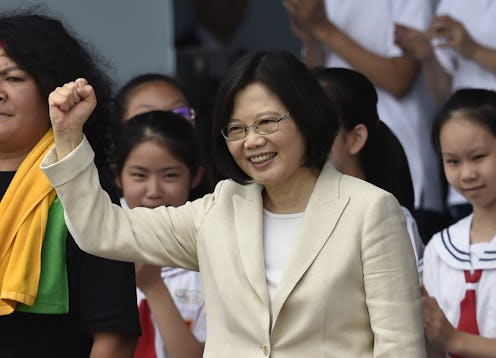News
How Taiwan's First Woman President Is Like Clinton
Taiwan made history on Thursday, May 19, as the country swore in Tsai Ing-wen as its first female president. In some ways, Ing-wen's win resembles the presumptive political landscape of America's presidential elections this year, especially among the political parties. But similarities between Clinton and Ing-wen go beyond surface-level comparisons of their parties' platforms: According to Taiwanese-American New Bloom magazine, both women were catapulted to the top of "center-Left" parties as presumptive candidates; both rose to power at a time when the opposing right-leaning parties didn't have an obvious candidate; both ran and lost presidential runs before; and "both present themselves as the only alternatives in a situation without alternatives and, in that way, as candidates who inevitably would have to be picked."
In terms of party platforms, the United States has a female candidate, Clinton, from a more liberal party that puts populist interests before those of "the establishment" presumably running against a male candidate, Donald Trump, from a relatively right-leaning party known for its desire to keep the status quo; in the case of Kuomintang (KMT, or Taiwan's Nationalist Party), to keep close ties with China, from whom Taiwan gained independence in the 1940s).
This historic election put Taiwan among 11 other nations with elected female heads-of-state.
In Taiwan, as in the United States, the lives of political candidates are put on display for all to see. Ing-wen is no different — the new Taiwanese president is known for her love of cats, as well as her academic background (she earned a law degree from Taipei’s National Taiwan University and a master's from Cornell University). Ing-wen is also known for her mixed ethnicity, as her paternal grandmother was Paiwan, the Taiwanese indigenous group, and her father Hakka (group from the Han Chinese), making her the first Taiwanese president of mixed Hakka and indigenous heritage.
In Taiwan, ties to Beijing are of major political concern. In a roundabout way, Ing-wen's somewhat murky stance on China draws another comparison to Clinton: Although spectators (rightfully) reported that China is watching her presidency closely, Ing-wen's election-night promise to "be a reliable, predictable partner in preserving cross-strait stability" with China echoes criticisms of Clinton's ties with "the establishment" and suspicions of her desire to maintain the American status quo. All the same, Ing-wen is "walking a tightrope" even in her inaugural address.
While context is important to inform American and other Western readers, New Bloom points out in their piece on comparisons between Clinton and Ing-wen that the most important difference between the two cannot be overlooked: that a leader of Taiwan is always under the shadow of China, a predicament Americans, as citizens of the world's greatest superpower, can never understand. Still, it's telling that Taiwan is now the second South Asian country after South Korea to elect a female president while the United States has yet to do the same.
